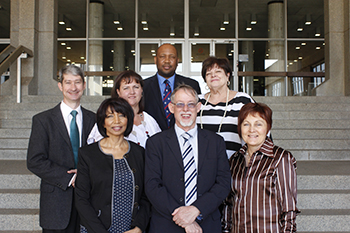Latest News Archive
Please select Category, Year, and then Month to display items
08 April 2021
|
Story Thabo Kessah
|
Photo UFS Photo Archive
 Dr KPD Maphalla with former UFS Chancellor, Dr Franklin Sonn, during the graduations in April 2007.
Dr KPD Maphalla with former UFS Chancellor, Dr Franklin Sonn, during the graduations in April 2007.
The University of the Free State is sad to learn of the passing of alumnus and award-winning Sesotho literary giant, Dr KPD Maphalla.
The literary works of Dr Khotso Pieter David Maphalla, like many other African writers and artists, were influenced and characterised by his own era of powerful forms of oppression and exclusion from dominant literary discourses. In his own right and through his writings of poetry, novels, short stories, and kodiamalla (dirge), he articulated a deliberate political and social protest and pushed for a place for African languages in literature at the height of apartheid.
“He entered the professional scene with his ground-breaking novel, Kabelwamanong, in 1982 at the age of 27. His career actually started in 1971 while he was still at school. Since his first novel, he has produced at least two books annually, covering the genres of poetry, novels, dramas, and short stories. As a dramatist, Dr Maphalla has written a number of excellent and educative radio dramas for the then Radio Sesotho (now Lesedi FM),” said his long-time friend and Head: African Languages at the University of the Free State, Dr Nyefolo Malete.
“It was for this writing prowess that he received recognition from the UFS when he was awarded an Honorary Doctorate in Literature by the Department of African Languages during a momentous ceremony on the Qwaqwa Campus in 2007,” added Dr Malete.
Dr Malete also revealed that, despite losing the use of his right hand after suffering a stroke following a car accident in the late 1990s, Dr Maphalla continued writing using his left hand. “He was adamant that, what he referred to as his ‘supposed disability’, would not deter his passion for writing.”
Dr Maphalla’s work has also produced numerous scholarly studies by the likes of Profs Moleleki Moleleki (protest poetry), Thapelo Selepe (lament and protest poetry), and Dr Seema Seema (process of cross-cultural communication). He was a committed Qwaqwa community member, who was also instrumental in the founding of Qwaqwa Community Radio (2000) and Metjodi Writers (2006), among others. He has written more than 70 books, many of which have been prescribed texts in schools.
Some of the awards he has won include:
South African Centre for Digital Language Resource (SADiLar) Sesotho Lexicographic Unit (Sesiu sa Sesotho) Lifetime Award for outstanding literary works and for promoting Sesotho literature (2019).
The Literature Festival and the University of the Free State Award for enormous contribution to Sesotho literature by a South African writer (2019).
Lifetime Achiever Award in Literature awarded by the Department of Arts and Culture (2005).
M-Net Book Prize for Sesotho poetry (2005). The first and thus far the only Sesotho author to have received this honour.
M-Net Book Prize for best novel (1996).
De Jager-HAUM Literary Award for his volume of short stories, Mohlomong Hosane (1993).
Thomas Mofolo Trophy for Best Novel, Best Poetry, and the Overall Award (1992).
Thomas Mofolo Trophy for Best Poetry (1991).
Dr JJ Moiloa Floating Trophy for Best Sesotho Poetry Book of the Year, Kgapa tsa ka (1985).
New schools, restructuring part of streamlined Faculty of Health Sciences
2017-10-12

From the left, front are: Dr Jocelyn Naicker,
Prof Gert van Zyl, Prof Magda Mulder;
back from left: Prof Chris Viljoen,
Marlene Viljoen, Deputy Director: Faculty of Health Sciences;
Prof Nathaniel Mofolo; and Prof Santie van Vuuren.
Photo: Rulanzen Martin
Numerous developments, such as the creation of two new schools and one newly restructured School of Medicine in the Faculty of Health Sciences at the University of the Free State (UFS), will catapult this renowned faculty to even greater heights.
Five-school structure to increase access
A five-school structure was proposed at the annual Faculty Management retreat in July 2016. The previous three-school model included the Schools of Medicine, Nursing, and Allied Health Professions.
The current School of Medicine has been restructured and will henceforth be known as the School of Clinical Medicine. The Schools of Pathology and Biomedical Sciences have been added to the faculty. “So, three new schools were in fact created within the faculty,” said Prof Gert van Zyl, Dean of the faculty.
“There was also a request from the National Health Laboratory Services to group academics that is rendering services in pathology into a new School of Pathology.” This is what motivated the faculty management to create two new schools.
Esteemed academics appointed
With the creation of the new schools, there were also new appointments within the Faculty of Health Sciences. Dr Jocelyn Naicker has been appointed as the new part-time Head of the School of Pathology, Prof Chris Viljoen was appointed as the part-time Head of the School of Biomedical Sciences, and Prof Nathaniel Mofolo as the new Head of the School of Clinical Medicine. Prof Santie van Vuuren remains Head of the School of Allied Health Professions, and Prof Magda Mulder as the head of the School of Nursing.
Research outputs to remain as usual
The addition of the new schools will not impact research output. “In the past, research was done across departmental boundaries between all the departments in the faculty,” Prof Van Zyl said. The advantages of adding two additional schools are that the workload will be distributed among the five schools. The heads of schools will work within their respective disciplines and related areas, and will eliminate the duplication of administrative functions.